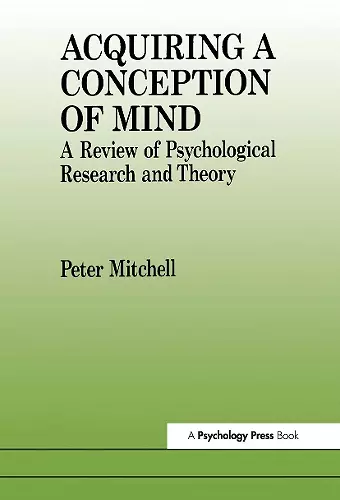Acquiring a Conception of Mind
A Review of Psychological Research and Theory
Format:Paperback
Publisher:Taylor & Francis Ltd
Published:5th Dec '96
Currently unavailable, and unfortunately no date known when it will be back

It seems the mind has evolved into such a powerful form that we are able to go beyond knowing the world and move towards knowing the mind itself. Being able to comprehend the mind permits smooth social interaction, since it allows us to anticipate the future actions of those around us. The apparently effortless quality of social co-ordination belies the complex process of conceptualization and inference that is actually at work. The odyssey of childhood, especially in the early years, presents a topic for investigation and speculation. A purpose of this book is to provide a thoroughly readable in-depth review of recent findings and theories about the development of understanding mind. In preparing this, a major goal was seen as composing text that is appealing in itself as a piece of writing. This book covers development from infancy to adulthood, and also considers related disorders of development especially autism. It goes beyond the narrow focus on the preschool years typical of most writings on the topic. One of the main themes in the book concerns the role of language and communication in development. Language could serve as a tool that helps the child to think more in the abstract and the hypothetical, once removed from reality. Being able to communicate with language virtually means that we are able to hear the thoughts of those around us. We hear what they think from what they say. Communication could thus provide a major catalyst in promoting the development of an understanding of mind. Perhaps it is no coincidence that children with autism who supposedly have an impaired understanding of mind also have impairments in language and communication.
'The book is an excellent, lucid guide to a densely argued area of empirical study which has emerged in the last ten years. It illustrates both the strengths and weaknesses of scientific psychology. The logic which motivates the experiments is well described and the sense of an unfolding detective story, as each experimental advance with its theoretical claims is unpicked by other workers and then incorporated into some yet more crucial empirical test, is psychology at its most fervent, rigorous and impressive. The book deserves to be read, not simply for its potential insight into children's developing mind, but also as a core text demonstrating how to write about and engage in the empirical pursuit of knowledge.' - Michael Burton, University of Sussex, UK
'In this lively, thought-provoking and up-to-date book, Peter Mitchell offers a bracing re-evaluation of research on what has come to be called children's 'theory of mind' (i.e. interpersonal understanding), integrating important comparative data from studies on non-human primates and autistic children. Mitchell's special strength lies in his ability to dissect subtle theoretical issues into their component parts, in such a way that they are amenable to scientific investigation - and the experimental studies of Mitchell and his colleagues demonstrate arresting ingenuity and adroitness.' - Peter Hobson (The Tavistock Clinic) (Review of the manuscript)
ISBN: 9780863777370
Dimensions: unknown
Weight: 294g
230 pages